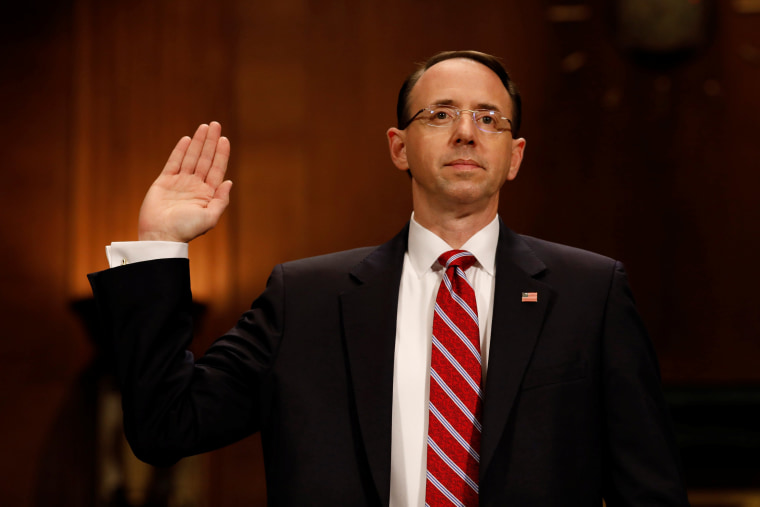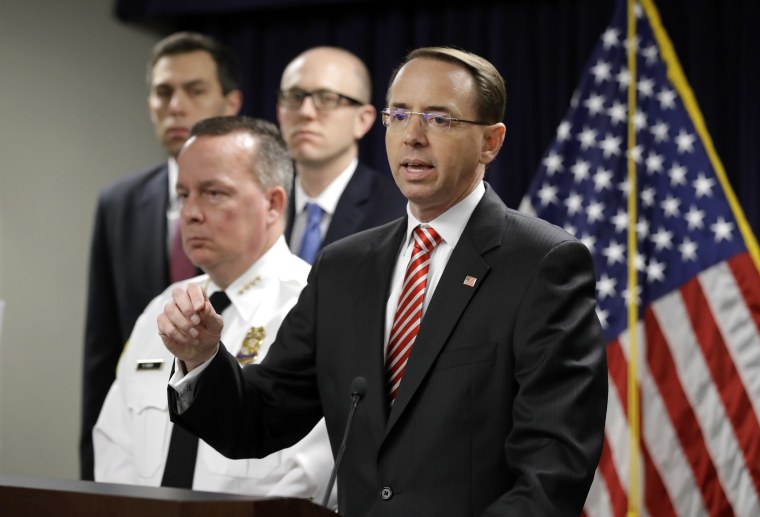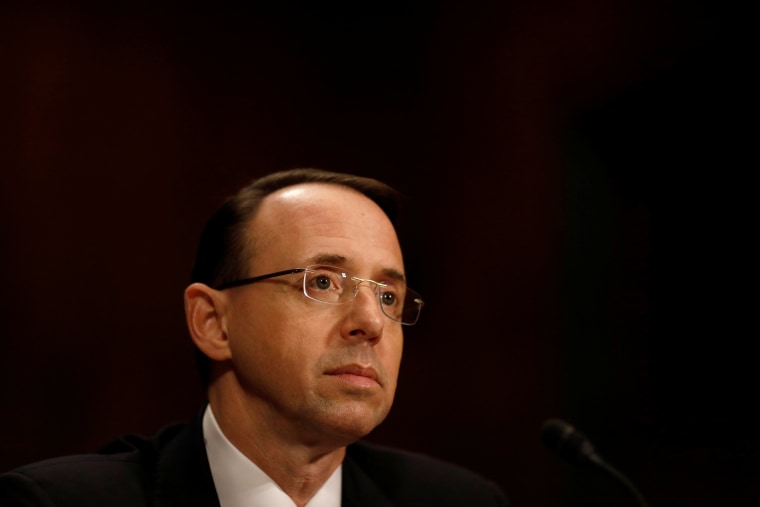Only two weeks after having been sworn into office, Deputy Attorney General Rod Rosenstein dropped an administrative bomb with a memo putting into motion the firing of FBI Director James Comey.
With that move, Rosenstein, a 27-year Justice Department veteran with a reputation for apolitical straight shooting, thrust himself into an already messy controversy regarding Comey's handling of the the investigation of Hillary Clinton's use of a private email server.
"Almost everyone agrees that the Director made serious mistakes; it is one of the few issues that unites people of diverse perspectives," Rosenstein wrote in the memo, dated Monday, to Attorney General Jeff Sessions.

"The way the Director handled the conclusion of the email investigation was wrong," he wrote. "As a result, the FBI is unlikely to regain public and congressional trust until it has a Director who understands the gravity of the mistakes and pledges never to repeat them."
Rosenstein, a Republican federal prosecutor who stepped into the spotlight after President Donald Trump nominated for the position in January, faced an onslaught of questions pertaining to Russia and Sessions' recusal from the Russia investigation.
Although he was confirmed 94-6, getting far more support than most other Trump nominees from Democrats, Rosenstein was staunchly criticized for refusing to commit to a special prosecutor to handle the Russia probe.
"The answer is I'm simply not in a position to answer the question," Rosenstein said, adding that he would need more information before making any decision. Rosenstein told Sen. Dianne Feinstein, D-California, that he wasn't aware of any reason he wouldn't be able to oversee the investigation.
The man known for reaching across the partisan aisle was one of a few U.S. attorneys who survived four previous administrations — Trump's is his fifth.
Fresh out of Harvard Law School — where he edited the Harvard Law Review — Rosenstein started with the Justice Department's public integrity section in 1990 under President George H.W. Bush, Justice Department said.

He then served as counsel to Deputy Attorney General Philip Heymann in President Bill Clinton's first term. During the Clinton administration, Kenneth Starr scooped him up to be part of the Whitewater investigation into Clinton's real estate dealings in Arkansas, which resulted in three convictions.
President George W. Bush nominated Rosenstein in May 2005 to be U.S. attorney for Maryland, a position he held onto for 12 years, through the entire Obama administration. He was the only U.S. attorney appointed by a previous administration to last all eight years of Obama's presidency.
"Rod is what you want in a professional prosecutor. He's intelligent, thoughtful and is dedicated to doing what he feels is right by the law, regardless of what anyone says," said St. Louis lawyer Jan Paul Miller, a former assistant U.S attorney in Maryland who worked with Rosenstein.
"He goes about his decisions in a methodical way, by finding facts and gathering evidence," Miller said. "He's a straight shooter and is not known to take his decisions lightly."
In 2012, Rosenstein oversaw a federal investigation into sensitive leaks that led retired Marine Gen. James E. Cartwright to plead guilty to making false statements about a covert U.S. cyber-attack on Iran's nuclear program.
Just before his confirmation as deputy attorney general, Rosenstein's Maryland office was involved in prosecuting and indicting seven Baltimore police officers on federal racketeering charges.
During his confirmation process, both of Maryland's Democratic senators, Chris Van Hollen and Ben Cardin, vouched for Rosenstein.
"Mr. Rosenstein has earned a reputation as a fair and focused administrator of justice," Van Hollen said in a statement.
In his written statement to the Senate Judiciary Committee, Rosenstein laid out his philosophy:
"Political affiliation is irrelevant to my work. Effective law enforcement requires us to work cooperatively with all local, state and federal partners, and with private sector stakeholders.
"The public may sometimes judge us only by whether we secure a conviction. But we hold ourselves to a higher standard. Justice is our name, and justice is our mission."
Editor's note: This article was first published March 7 when Rod Rosenstein was appointed deputy attorney general and has been updated to reflect this week's events.

